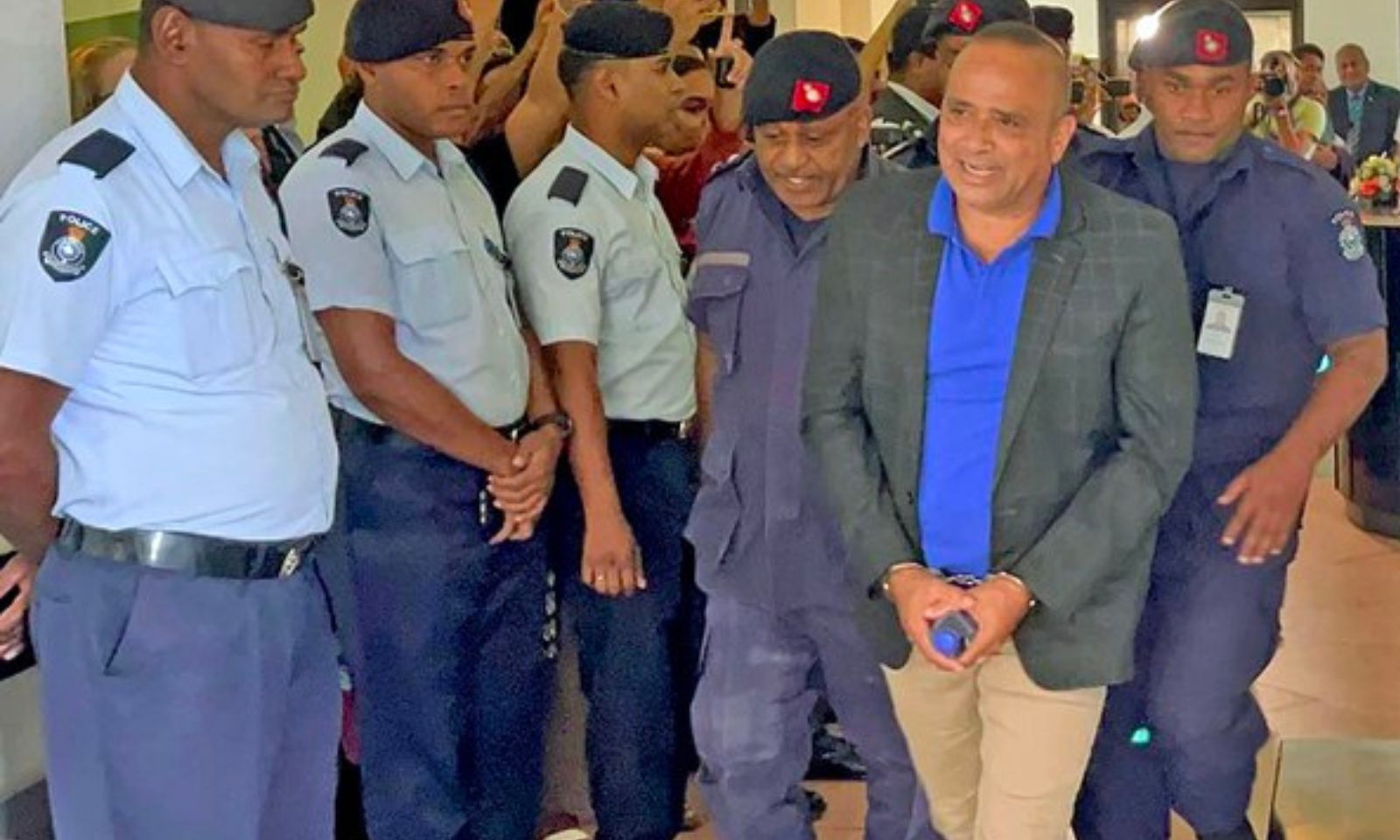

Former Fijian prime minister Frank Bainimarama heads to prison to serve his sentence, left. At right is as army commander, he ousted the democratically-elected government of the late Laisenia Qarase on 5 December 2006.
Photo/supplied
The fall of Frank Bainimarama and Fiji First
Once the most powerful man in Fiji, the former prime minister and coup leader now sits in a prison cell with his party deregistered this week. But what does it mean for the political landscape in the Pacific island nation?


Losing her vision at 29, woman found a crisis Pacific communities can’t afford to ignore

Kings bring OFC Pro League home as storms hit round three fixtures

Fears that new police powers will push Pacific youth further into harm

Pacific calls for action on climate change and illegal fishing at major ocean naval forum

Losing her vision at 29, woman found a crisis Pacific communities can’t afford to ignore

Kings bring OFC Pro League home as storms hit round three fixtures

Fears that new police powers will push Pacific youth further into harm
The deregistration of Fiji's largest political party this week is the "last act, the completion" of Frank Bainimarama's political career, sociologist Steven Ratuva says.
Fiji First was deregistered on Monday, the registrar of political parties Ana Mataiciwa confirmed in a statement.
The former prime minister was sentenced to a year in prison on 9 May for obstructing a police investigation into corruption at the University of the South Pacific in Suva.
"He's now in prison. So, the political party which made him prime minister is now gone. So his future as a politician is gone," Ratuva, Pro Vice-Chancellor at the University of Canterbury, told Pacific Mornings' William Terite.
"So that is the end of, if you like, a phase in Fiji's political history, since the coup in 2006, the coup that he started. So now it's a new phase, the post-Bainimarama era, you may call it that."
Mataiciwa said Fiji First was deregistered by section 12 (4) of the Political Parties (Registration, Conduct, Funding & Disclosures) Act 2013.
"On Thursday 30 May 2024, FijiFirst was notified to amend its constitution to include provisions required under Schedule 2 of the Act.
"The party was given until 4pm on Friday 28 June 2024, to make the necessary amendments. As the party has not complied with this requirement, FijiFirst is hereby deregistered effective immediately."
Bainimarama, 70, a former military commander, first seized power in Fiji in a 2006 bloodless coup. He retained office through winning democratic elections in 2014 and 2018.
But he was ousted in 2022 by the country's new leader Sitiveni Rabuka's People Alliance Party. Rabuka formed a coalition government with the National Federation Party and Sodelpa.
Bainimarama was jailed alongside suspended police commissioner Sitiveni Qiliho, who was handed a two-year sentence.

Suspended Fijian police commissioner Sitiveni Qiliho was sentenced alongside Frank Bainimarama on 9 May. Photo/supplied
Both men had used their power to sideline the investigation at the university.
"The Bainimarama era was huge in different ways. One was that he put together a series of political and legal reforms," Ratuva said.
"A lot of the decrees that he put into place have now been either changed or some of them are still there.
"The new constitution came into being and is still one of his big footprints in the history of Fiji, and now there’s talk of reviewing the constitution."
But Ratuva said although the Bainimarama era has gone, "his footprints are still there in some form or other".
He said the remnants of the Fiji First Party, and the politicians who were part of the party who remained in parliament were now independents.
"They now have a choice either to remain as independents and form a loose group of opposition, or they may be co-opted into the coalition party in power.
"Rabuka [prime minister] has a close relationship with some of them. They were also officers in the army. And so he's been talking about incorporating some of them to be part of the national unity, government of national unity he's been talking about.
"So the future is going to be very different without Bainimarama. It’s going to be determined largely by coalitions because the constitutional provision for the electoral system is based on proportional representation."
Ratuva said with the fall of Bainimarama and the Fiji First, the proportional representation (PR) electoral system would mean coalitions in the future.
The PR system was first designed in Europe in the last century and aimed at coalitions, for small parties and other fringe groups to be a part of the government.
"So, you are going to see a future full of coalitions. In New Zealand, we have our problems with the coalitions internally, but they try their best to sustain them.
"So a lot of the energy, when you have collision governments, have to do with trying to sustain the coherence of the centre, to make sure that the coalition partners do not fly away in all directions and then the government collapses.
"The fall of Bainimarama was basically a major fall from the height of his political power, the most powerful person in the country, to basically losing his rights as a citizen by going to prison.
"It's probably the largest fall in the history of Fiji for anyone. So in terms of succession, he centralised a lot of power and he tried to groom someone. There were assumptions about who he was going to be grooming.
"The former leader of the opposition, Seruiratu is a former army officer as well. At the same time, Ayaz Khaiyum, the attorney general and minister for the economy, was running everything. So he had a lot of power, which overshadowed even Bainimarama’s power."